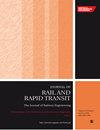根据轨道动态稳定过程中的测量结果估算道碴刚度
IF 2.1
4区 工程技术
Q3 ENGINEERING, CIVIL
Proceedings of the Institution of Mechanical Engineers Part F-Journal of Rail and Rapid Transit
Pub Date : 2024-09-07
DOI:10.1177/09544097241278011
引用次数: 0
摘要
众所周知,使用动态轨道稳定器(DTS)压实道碴可通过提高道碴的刚度来改善轨道的横向阻力。本文介绍了根据动态轨道稳定过程中的测量结果估算随应变变化的无砟轨道剪切模量 G 的两种方法。一种方法是利用哈丁方程及其对粗粒土的增强作用来估算给定粒度分布曲线的小应变剪切模量。由于绕行 DTS 会在观测到的枕木(位置固定)上产生不同的剪切应变,因此在道碴层顶部和底部边缘使用加速度计测量道碴剪切应变,可得到剪切模量退化曲线 G/Gmax。根据定期维护作业的数据显示,这些剪切模量衰减曲线与之前的研究结果一致。第二种方法是针对谐波载荷(由动态轨道稳定器引起)下的轨道-道碴相互作用建立 SDOF 模型。影响线用于估算质量、质量惯性矩和等效机器基础的几何形状(根据霍尔模拟法估算弹簧和仪表盘系数)。使用优化算法将模型响应与 DTS 现场测试的测量数据进行拟合。得出的剪切模量显示了松散和压实压载条件下的合理值,这证明了所提出的方法作为未来使用 DTS 的智能压实 (IC) 系统基础的潜力。本文章由计算机程序翻译,如有差异,请以英文原文为准。
Ballast stiffness estimation based on measurements during dynamic track stabilization
Ballast compaction with the Dynamic Track Stabilizer (DTS) is known to improve the lateral track resistance by increasing the stiffness of the ballast. This paper presents two approaches for estimating the strain dependent ballast shear modulus G based on measurements during dynamic track stabilization. One approach uses the Hardin equation with its enhancement for coarse-grained soils to estimate the small strain shear modulus for a given grain size distribution curve. Since different shear strains are induced on an observed sleeper (with fixed location) by a bypassing DTS, the measurement of ballast shear strains with accelerometers on the top and the bottom edge of the ballast layer yield shear modulus degradation curves G/Gmax . It is shown for data from a regular maintenance operation, that these shear modulus degradation curves are in accordance with previous research. For the second approach, a SDOF model for the track-ballast interaction under harmonic loading (caused by the dynamic track stabilizer) is developed. Influence lines are used to estimate the mass, the mass moment of inertia and the geometry of an equivalent machine foundation (with spring and dashpot coefficients according to the Hall analog). An optimization algorithm is used to fit the model response to the measured data from field tests with the DTS. The resulting shear moduli show plausible values for loose and compacted ballast conditions, which proves the potential of the presented method as a basis for a future system for Intelligent Compaction (IC) with the DTS.
求助全文
通过发布文献求助,成功后即可免费获取论文全文。
去求助
来源期刊

CiteScore
4.80
自引率
10.00%
发文量
91
审稿时长
7 months
期刊介绍:
The Journal of Rail and Rapid Transit is devoted to engineering in its widest interpretation applicable to rail and rapid transit. The Journal aims to promote sharing of technical knowledge, ideas and experience between engineers and researchers working in the railway field.
 求助内容:
求助内容: 应助结果提醒方式:
应助结果提醒方式:


